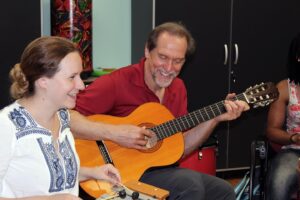By SMWC Blog Editors

A senior clinician, level III trainer/educator and researcher, Alan Turry is the managing director of the Nordoff-Robbins Center for Music Therapy at New York University Steinhardt. Since 2001, he has been teaching advanced improvisation and composition in the Saint Mary-of-the-Woods College (SMWC) Master of Arts in Music Therapy (MAMT) program. He also teaches clinical improvisation at NYU’s graduate music therapy program, as well as a number of institutions in the U.S. and abroad. Turry earned B.A., M.A. and DA degrees in music therapy from NYU. Here’s an excerpt from a recent Q & A with Turry.
Q: What is the best part about teaching at SMWC?
A: I love working with the staff. I love Tracy Richardson and I have a great amount of respect for her. She’s really a pioneer in bringing in higher level ideas into the music therapy program. She’s brought in people that she respects and has really created a program where people can stay where they are living, come here, and do these intensives that I think are very powerful. And there aren’t a lot of music therapy programs where people can do their graduate studies like that.
So, I have great deal of respect for Tracy in doing that and I enjoy working with students from all around this part of the country and I love their energy and enthusiasm and their willingness to take risks and learn things they’ve heard about but really haven’t had the chance to develop.
Q: What do you hope students get out of your classes?
A: That the thing that they love about music is present with them when they’re doing their music therapy work. That they can feel that spark that brought them into music and why they love music, why they knew that there was something about music that could be a powerful experience for somebody to help them. That is in their sessions; It’s not only a clinical technique but something that brings in their creative and authentic spark.
Q: What’s unique about this program?
A: First of all, as I was saying, I don’t know if there are any other master’s programs where people can do this long distance learning. The fact that Tracy’s bringing in experts in different areas of music therapy — guided imagery is a particular specialization in music therapy, Nordoff-Robbins approach [to improvisation], this music-centered approach which I’m introducing to the students — these are very specialized areas within the field of music therapy and she’s bringing them together into one location. I think people are very appreciative of that. It’s not easy to have that experience in one place.
Q: So, students really benefit from this program.
A: Yes, and it’s a nice, well-rounded experience for them. I just enjoy watching them begin to trust themselves, begin to kind of recognize and remember ‘hey, I am a creative person and I can utilize that as a music therapist and really emphasize the music-centered aspect of music therapy.’
Q: How did you decide this field is for you?
A: Well, I’ve always played music by ear; I was encouraged to express myself in music and I was not a formally-trained musician but I was always playing music. I had a sense that I wanted to do something with music and I heard about music therapy in high school and that’s where it all started. So, it has been a very rewarding experience for me not only personally developing myself, my musicality, my awareness of myself and becoming a teacher, learning from the students but also getting to travel all over the world.
… It feels special to come here [SMWC campus], to be in this kind of reverence of the greenery and the wide open spaces. I grew up in Brooklyn, New York so, I’m used to a lot of buildings around me all the time and fast pace. It’s nice to be in a place where things slow down and I can get in touch with myself a little more.
Q: Why is music therapy important?
A: Music reaches people. Music crosses divides. Music bypasses barriers. We all have the capacity to be moved by music, to feel connected to others through music. I think now more than ever, we need to create experiences and have a feeling of connection, support, unity, and music is just a great way of doing that.

0 Comments